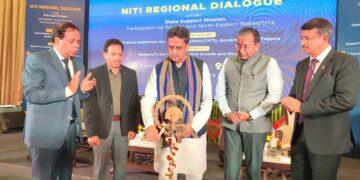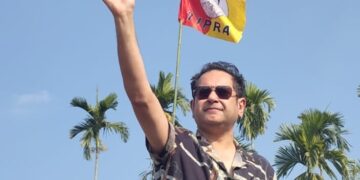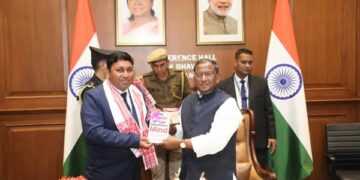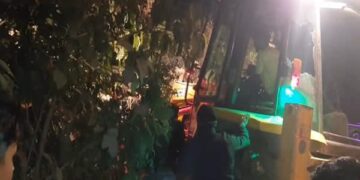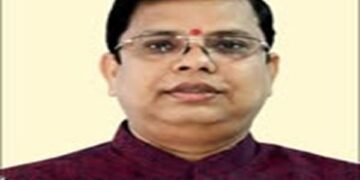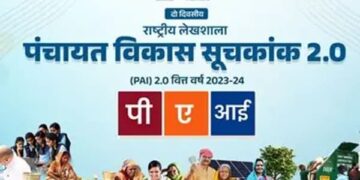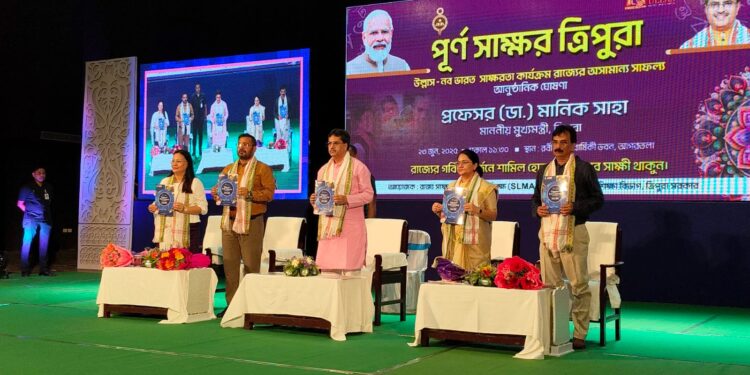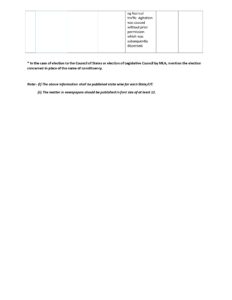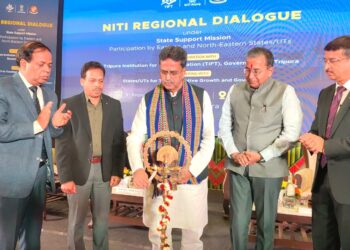Agartala, June 23: In a landmark achievement, Tripura has been officially declared a fully literate state, making it the third in India and second in the region to earn the distinction after Mizoram and Goa.
Chief Minister Dr. Manik Saha made the formal announcement during a celebratory event at Rabindra Satabarshiki Bhavan on Monday, calling it a proud moment and a transformative milestone in the state’s socio-educational journey.
The declaration follows the success of the ‘ULLAS – New India Literacy Programme’ (Understanding Lifelong Learning for All in Society), launched under the National Education Policy 2020.
Tripura’s literacy rate, which was 93.7% as per the 2023–24 Periodic Labour Force Survey (PLFS), has now climbed to 95.7%, surpassing the 95% benchmark set by the Centre to qualify for the “fully literate” status.
“Today’s achievement of 95.7% literacy in Tripura, and the third Indian fully literate state, is not just the success of a programme but a reflection of collective will and societal commitment,” said Dr. Saha, who also holds the Education portfolio.
He stressed that such a revolution in literacy could not have been possible by teachers alone but was made successful by the joint efforts of citizens, students, and volunteers across the state.
Literacy, the Chief Minister said, must be inclusive and far-reaching, cutting across class and social boundaries.
He called on the public to ensure literacy reaches every domestic worker and underprivileged community, underscoring its significance in building a ‘Viksit Bharat’ (Developed India).
Dr. Saha also felicitated several newly literate individuals, along with the dedicated volunteers who played a vital role in the success of the literacy mission.
The programme’s implementation involved a multi-tiered effort. Committees were formed at the state, district, and block levels to coordinate the drive. Educational materials were developed in Bengali, English, and Kokborok, and thousands of volunteer teachers – including students, retired educators, and trained personnel – took part in the mission.
More than 2,200 volunteers, over 940 Social Awareness Centers, and the active participation of the Youth Literacy Corps played a crucial role in ensuring that even the most remote tribal villages and hill markets were brought under the literacy net. In many cases, people conducted classes in their courtyards or held literacy sessions in local bazaars.
Speaking at the event, Priti Mina, Director in the Department of School Education & Literacy, PM-SHRI, National Education Policy, Adult Education, outlined the rigorous evaluation process adopted before awarding the ‘fully literate’ status.
She lauded Tripura for its exemplary performance in implementing functional literacy – going beyond the basics of reading and signing names, to include digital literacy, financial awareness, and critical life skills.
Director Mina informed that under the ULLAS scheme, around 2.7 crore learners have been enrolled across the country, with the help of 41 lakh volunteers who have actively participated in teaching reading and writing skills. As a result of this massive nationwide effort, nearly 1.6 crore individuals have already attained literacy.
She added that this initiative is crucial, as India aims to achieve complete literacy by 2030 in alignment with the United Nations Sustainable Development Goals (SDGs).
Tripura’s literacy journey has been a long one. In 1961, the state’s literacy rate was just 20.24%. It climbed to 87.22% by the 2011 census, at which point Tripura held the third-highest literacy rate in India. While earlier campaigns emphasized basic skills, the current administration aimed for comprehensive, lifelong learning, aligned with national goals for 2027.
Certification for learners is being done by the National Institute of Open Schooling (NIOS), providing official recognition of their newly acquired knowledge and capabilities.
Tripura’s achievement stands as a testament to the power of collective resolve, effective planning, and a deep-rooted commitment to education — a true example of social progress through inclusive governance.

